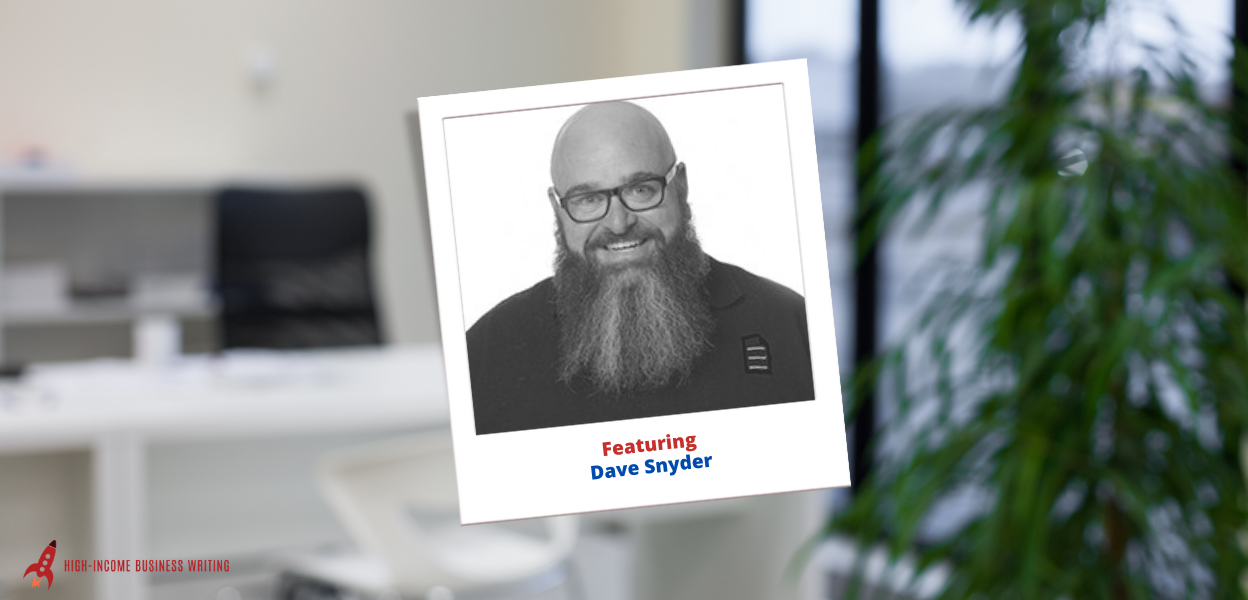Most writers aren’t interested in growing their business from a one-person operation into a massive agency with thousands of contractors.
They simply want to earn more in less time and maintain a lifestyle business.
Dave Snyder is different. About 12 years ago, he decided to grow his writing business aggressively by going after clients that need marketing content at scale.
The road to Dave’s success wasn’t easy. He faced constant challenges that would have caused most people to give up.
Today, his content agency, CopyPress, is a successful, eight-figure business with dozens of employees and more than 2,700 writers.
In this podcast episode, Dave shares his biggest mistakes and explains how he succeeded in a market overflowing with content agencies.
Even if you have zero interest in scaling your business to anywhere near this level, you’re going to enjoy this conversation.
The notes that follow are a very basic, unedited summary of the show. There’s a lot more detail in the audio version. You can listen to the show using the audio player below. Or you can subscribe on Apple Podcasts, Spotify, Stitcher, Google Podcasts, Amazon Music or wherever you listen to podcasts.


High-Income Business Writing with Ed Gandia
#296: How Dave Snyder Scaled Up to an 8-Figure Content Writing Business’
Tell us about yourself and your business
Dave is the CEO of CopyPress, a content production company. CopyPress doesn’t just connect writers and clients, it also provides quality assurance, editing and platform integration.
The company specializes in creating content at a huge scale. In some cases, it produces 2,000 to 3,000 articles per month for customers.
About half of CopyPress’ business comes from enterprise clients with $1 billion in revenue. The other half comes from agencies that want to scale their content services efficiently.
You struggled to stay profitable for the first few years you were in business. Tell us about those early challenges.
When Dave first started out, Google was just starting to value quality content.
Dave saw the change coming, so he pre-emptively started to pay his writers more, and charge his customers more, for quality content. He struggled to compete and had to wait for the market to move towards him—which took five to six years.
In the meantime, Dave put everything he had into the business to keep it afloat.
The lesson: don’t scale before you’re ready. Focus on maintaining your profitability and meeting your payroll.
What are some of the things you learned along the way?
Dave is loyal by nature, so he did everything possible to keep his people employed, no matter the personal cost. But you need to maintain a balance. Of course, you should treat your employees well, but there are limits.
Sometimes you’ll need to make cuts, and that’s okay. Businesses change and evolve.
Over the years, Dave has employed hundreds of people who have come and gone. He’s satisfied that everyone left with a net positive.
Picking the right investors is also critical. Dave took on some investors very early on. Fortunately, they gave him space to learn and make mistakes. If he had taken on venture capital as a software-backed company, CopyPress probably would have gone out of business.
Tell us about building your platform
Dave knew that scaling content was CopyPress’ core differentiator. To create content at a large scale, you need to onboard writers and pay them, a system that can
load lots of content and build workflows around them and customized templates that have commenting and editing features.
In theory, you could do this all in Google docs, but it would quickly become untenable. So Dave created their own platform.
He puts $500,000 into platform development every year.
What’s your staffing model?
CopyPress has a hybrid model of employees and contractors.
Most contractors also have their own customers. They use CopyPress to fill in gaps in their schedule.
They have about 50 internal writers and 10 internal editors. They’ve also integrated with Proofed, a company that only does editing.
CopyPress also has tech, production, and HR staff.
Tell us about your sales strategy. How are you using it to grow your business consistently?
Dave had a sales team, but he let them go in October and took over the role himself.
He pitches new clients on a three-month proof of concept agreement. He doesn’t want to lock into a long-term contract right away in case the client isn’t a fit or vice versa.
How do you get your leads?
CopyPress gets lots of leads from organic search as well as webinars and newsletters. They also have lots of secondary conversion elements, such as signing up to receive an ebook or case study.
Dave’s network and referrals are also a big source of leads.
What’s your advice to someone wanting to scale up to a small team?
Become an expert in a niche market and build your marketing content around that.
You can’t scale yourself, so you’ll need to building training modules. You’ll also have to invest people to get them up to speed, which is where you have to decide whether to work with a contractor or hire an employee.
Where can listeners learn more about you?
dsnyder@copypress.com
By the way… whenever you’re ready, here are 3 ways I can help you grow your freelance business:
1. Grab a free copy of my book.
It’s called Earn More in Less Time: The Proven Mindset, Strategies and Actions to Prosper as a Freelance Writer. The title says it all. 😉 — Click Here
2. Join my implementation program and be a case study.
I’m putting together a new implementation group this month. If you’re earning $5k+/month (or the part-time equivalent) from your freelance business … and you’d like to grow your income quickly with better clients … just email me at ed@b2blauncher.com
3. Work with me privately.
If you’re a 6-figure writer who’s trying to earn more in less time, with less stress, I might be able to help you get there faster than you think. Just email me at ed@b2blauncher.com and put “Breakthrough” in the subject line, and I’ll get back to you with more details.






